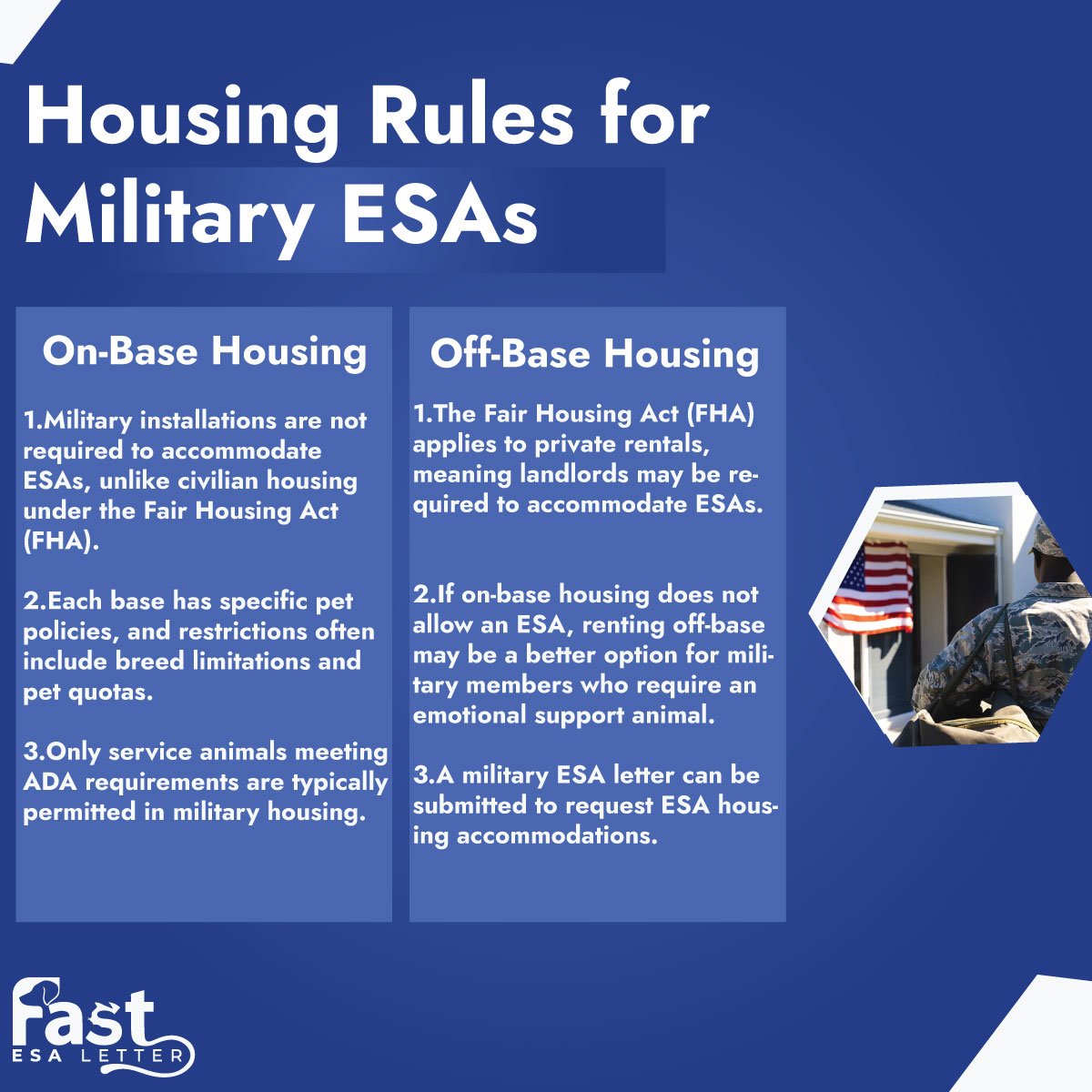Can Active-Duty Military Have an ESA? Know the Rules & Reality

Robert Clendenin, MD
Military life is anything but easy. The long hours, frequent relocations, and high-stress environments can take a serious toll on mental well-being. For some, emotional support animals (ESAs) provide a much-needed source of comfort. But here’s the big question: Are active-duty military members allowed to have an ESA?
The answer isn’t as straightforward as you might hope. Military ESA policies are different from civilian regulations, and while ESAs can be incredibly beneficial, they don’t have the same legal protections as service animals.
So, where does that leave active-duty service members who want an ESA? What are the rules, and what options do they have? This guide breaks it all down so you can understand what’s allowed, what’s not, and what alternatives might be available if an ESA isn’t an option. Let’s dive in!

What is an Emotional Support Animal?
Emotional Support Animals (ESAs) offer companionship and therapeutic benefits to individuals facing mental health challenges such as PTSD, anxiety, and depression. Unlike service animals, ESAs do not require specialized training to perform specific tasks related to a disability.
For active-duty military personnel, it’s crucial to understand the distinction between ESAs and service animals due to differing legal recognitions and accommodations:
- Service Animals: Trained to perform tasks directly related to a handler’s disability, service animals are protected under the Americans with Disabilities Act (ADA). This protection generally allows them access to public spaces and military housing.
- Emotional Support Animals: While ESAs provide significant emotional comfort, they lack the ADA protections afforded to service animals. Consequently, ESAs do not have guaranteed access to public areas or military installations.
The U.S. Army’s policy defines ESAs as companion animals that do not qualify as service animals. Therefore, ESAs are considered pets and do not receive special accommodations within military settings.
Are ESAs Allowed for Active-Duty Military Members?
- A military emotional support animal letter does not guarantee ESA access to military housing.
- Each branch of the military (Army, Navy, Air Force, Marines, Coast Guard, and Space Force) has its own pet policies, which often restrict ESAs.
- ESA accommodation for military members is at the discretion of private landlords when renting off-base housing.
No, assigned duty military individuals cannot have an ESA, according to the policy outlined in the Department of Defense. If an individual is assigned to military duty, they are only able to have a service animal in the event they need extra support.
However, there are important considerations for service animals across all military branches:
- A service dog is allowed if the service member is in recovery and has medical conditions that require assistance with daily tasks.
- The use of animal-assisted therapy and animal-assisted activities must comply with policies set by the Military Departments.
- Military dogs are adopted by service members, but any dog not obtained from an accredited service dog organization approved by the VA does not qualify as a service dog.
Although Army ESA rules for active-duty military do not provide the same protections as civilian laws, alternative support options are available for service members who need emotional assistance
Housing Rules for Military ESAs
On-Base Housing
For service members living in military housing, ESA accommodation is not guaranteed. Each installation sets its own regulations, and while some commanders may grant exceptions, it is not a legal requirement for bases to accept ESAs.
- Military installations are not required to accommodate ESAs, unlike civilian housing under the Fair Housing Act (FHA).
- Only service animals meeting ADA requirements are typically permitted in military housing.
- Each base has specific pet policies, and restrictions often include breed limitations and pet quotas.

Off-Base Housing
For active-duty personnel seeking to live off-base, ESA policies may be more flexible:
- The Fair Housing Act (FHA) applies to private rentals, meaning landlords may be required to accommodate ESAs.
- A military ESA letter can be submitted to request ESA housing accommodations.
- Some landlords still impose breed restrictions and pet policies, so approval is not always guaranteed.
- If on-base housing does not allow an ESA, renting off-base may be a better option for military members who require an emotional support animal.
How to Get a Service Animal for Military Personnel?
For military members who need assistance beyond emotional support, a service animal may be the best option. They can accompany their handler in public places and are generally permitted in military housing, making them a more viable option for active-duty personnel who require specialized assistance.
- Consult a Military Doctor or Mental Health Professional
Before getting a service animal, an active-duty service member or veteran must consult a licensed healthcare professional—this could be a military physician, psychologist, psychiatrist, or licensed therapist. The provider will evaluate whether the individual’s disability or mental health condition warrants the use of a service animal. Conditions that may qualify include:
- Post-Traumatic Stress Disorder (PTSD)
- Severe Anxiety or Panic Disorders
- Depression or Mood Disorders
- Mobility Impairments
- Hearing or Vision Impairments
- Seizure Disorders
It’s important to be honest and detailed about how a service animal could mitigate daily challenges and improve the ability to function in military or civilian settings.
- Obtain a Service Animal Recommendation
If a licensed mental health professional or doctor determines that a service animal is necessary, they will provide official documentation or a recommendation letter. This recommendation should specifically outline the tasks the service animal will be trained to perform related to the individual’s disability.
- Choose a Service Animal Training Path
Once approved, the next step is obtaining a service dog. There are three main ways to acquire a trained service dog:
- Getting a Pre-Trained Service Dog from a Reputable Provider
- Working with a Professional Trainer
- Self-Training a Service Dog
What are the Best Dog Breeds for Military Personnel?

- Labrador Retriever: Intelligent, trainable, and known for emotional sensitivity.
- Golden Retriever: Gentle and highly social, making them ideal for PTSD therapy.
- German Shepherd: Loyal, protective, and great for physical and emotional support.
- Standard Poodle: Hypoallergenic and intelligent, perfect for those with allergies.
- Boxer: Affectionate and strong, providing a balance of emotional and physical support.
These breeds are commonly used in military and veteran service dog programs due to their temperament, intelligence, and trainability.
Alternative Support Options for Emotional Assistance
- Mental Health Resources: Comprehensive mental health programs available through military installations offer support tailored to the unique challenges faced by service members.
- Counseling Services: Licensed mental health professionals provide confidential counseling and therapy.
- Therapy Programs: Specialized therapy programs, including group and individual sessions, are designed to address the emotional and psychological needs of active-duty personnel. For veterans, programs incorporating emotional support dogs for veterans can also be considered as part of a broader treatment plan.
These services are integrated within the military framework and are structured to meet the high standards, ensuring that all active-duty personnel receive comprehensive care and support.
Conclusion
If you are an active-duty military member considering an ESA, it’s important to explore your housing options, obtain a legitimate military ESA letter, and understand the limitations of military regulations. For those with service-connected disabilities, a trained service dog may be a more viable and legally protected alternative.
By understanding the rules, exploring alternatives, and seeking professional guidance, service members can find the right emotional and mental health support system to thrive in their military careers and beyond.
Frequently Asked Questions (FAQs)
Can Military Members Have an ESA in Off-Base Housing?
Can Active-Duty Military Bring ESAs on Deployment?
Can You Have an ESA in Military Housing?
Can Emotional Support Dogs For Veterans Accompany Their Owners On Military Bases?
No, emotional support dogs for veterans do not have the same legal protections as service animals under ADA or military policies. While some commanders may grant permission, military ESA letters do not guarantee access to base facilities.
Can An ESA Be Converted Into A Service Animal For Active-Duty Military Members?
Can A Military Emotional Support Animal Letter Help In Getting Off-Base Housing Approval?
Can Active-Duty Military Members Bring ESAs To Overseas Deployments?
Can Military Spouses Have An ESA In On-Base Housing?
Post Author
Prince Sharma
Related Articles
Can You Bring an ESA Dog to Starbucks?
Can You Bring an ESA Dog to Starbucks?No, emotional support animals (ESAs) are generally not allowed inside Starbucks stores. However, many Starbucks locations offer outdoor seating areas where leashed dogs, including ESAs, are welcome. Medically...
Does Costco Allow Dogs?
Planning to Bring Your ESA Dog to Costco? Read This First.No, Costco does not allow ESA (Emotional Support Animals) in its stores. Only ADA-recognized service dogs that are trained to perform specific tasks for individuals with disabilities are...
Fast ESA Letter vs. ESA Doctors: Which ESA Service is Right for You?
Fast ESA Letter vs. ESA Doctors: Which ESA Service is Right for You?Fast ESA Letter and ESA Doctors both facilitate access to licensed mental health professionals for ESA letters. Each service has its own approach, and understanding the differences...
Live Free with Your ESA!
An ESA Letter Unlocks Freedom!






